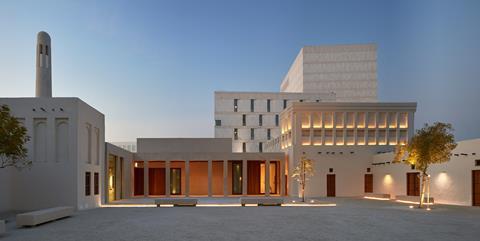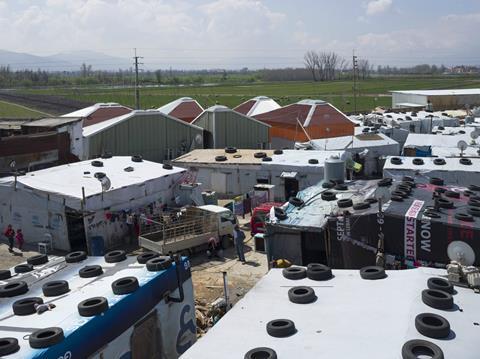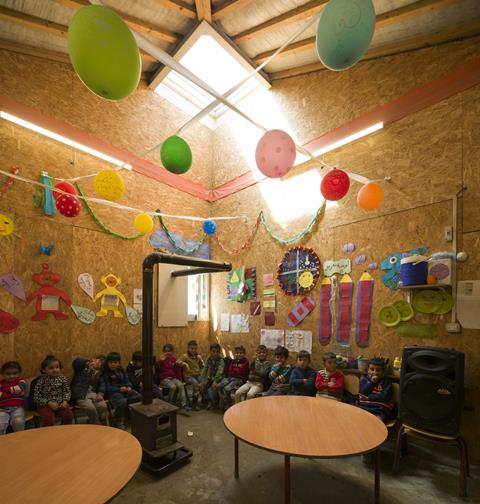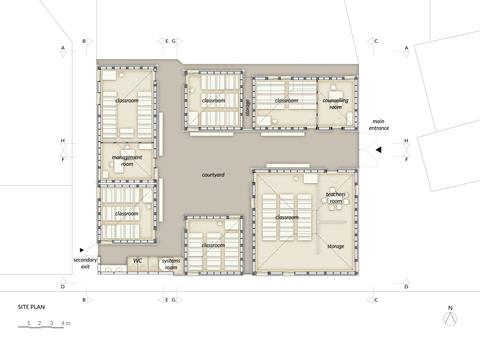School for Syrian refugees and Qatari cultural project in running

John McAslan & Partners and a small charity specialising in supporting vulnerable communities are the only two British architects shortlisted for the Aga Khan Award for Architecture 2019.
Altogether 20 projects have been shortlisted for the $1m prize. A team of specialists will visit each scheme before reporting back to this year’s jury which includes David Chipperfield and Elizabeth Diller.
The Aga Khan Award for Architecture is one of the oldest major architectural awards. It selects projects globally that not only exhibit architectural excellence, but also improve the overall quality of life in communities in which Muslims have a significant presence.
McAslan has been shortlisted for its Msheireb Museums, four historic houses in a historic area of central Doha that have been remodelled and extended into a contemporary museum of Qatari history and culture.
London-based CatalyticAction, formed in 2014 by several UCL graduates, has been shortlisted for a school in Lebanon for children from 300 Syrian refugee families.

Adapted from the Save the Children Italy pavilion at the Milan Expo 2015, it is a source of pride for the refugees who helped redesign and build it. It also serves as a hub for community activities and is the settlement’s only secure shelter in the event of snowstorm or earthquake.
The open-sided pavilion was transformed into a series of enclosed spaces around a courtyard through a participative process. All transformation materials were locally sourced, including sheep’s wool to insulate against cold and heat, regulate humidity, resist fire and provide sound insulation.

Other contenders for the 2019 prize include Heneghan Peng for the Palestinian Museum, Snohetta for Muttrah Fish Market in Oman and OMA for Concrete, a cultural hub in Dubai that involved the conversion of four existing warehouses.
To be eligible, projects had to be completed between 2012 and 2017 and have been in use for at least one year.
The winners will be announced this autumn.

The 20 shortlisted projects
Bahrain
-
Revitalization of Muharraq, offers testimony on the pearl trade in the Arabian Peninsula over the centuries, especially when Bahrain thrived during the 19th century. Architect: Authority for Culture & Antiquities Conservation Department, Manama, Bahrain
Bangladesh
-
Arcadia Education Project, in South Kanarchor, a modular amphibious structure – incorporating space for a preschool, a hostel, a nursery and a vocational training centre – which is tied down on a riverine site that is often flooded for five months every year. Architect: Saif Ul Haque Sthapati, Dhaka, Bangladesh
-
Amber Denim Loom Shed, in Gazipur, a new design that combines traditional Bangladeshi residential architecture and contemporary elements in a large open space that accommodates machines, a buyers’ lounge, a dining space, a prayer area and washrooms. Architect: Archeground, Dhaka, Bangladesh
China
-
Courtyard House Plugin, in Beijing, a prefabricated modular system first developed as a prototype for installation within courtyard houses in the traditionally Muslim district of Dashilar, which is home to communities who do not have the means to renovate. Architect: People’s Architecture Office, Beijing, China
Djibouti
-
Tadjourah SOS Children’s Village, a design based on a traditional medina and a layout of narrow streets that maximises shade and ventilation while providing shelter for the most vulnerable in society. Architect: Urko Sanchez Architects, Nairobi, Kenya
Ethiopia
-
Warka Water, a prototype first implemented in Dorza, consists of an elegant triangular frame made out of local bamboo that encloses a thin polyester mesh – which captures droplets from high humidity in the air. Architect: Arturo Vittori, Rome, Italy
Iran
-
Enghelab Street Rehabilitation, in Tehran, encompasses both the rehabilitation of the façades of 114 existing buildings and the creation of public cultural space between the national theatre and opera house. Architect: Iwyan Consultants, Tehran, Iran
Indonesia
-
Taman Bima Microlibrary, in Bandung, aims to help combat Indonesia’s low literacy rates by adding a microlibrary above a pre-existing stage used for community events. Architect: Shau Architects, Bandung, Indonesia
-
AM Residence, in Jakarta, a design inspired by Indonesian vernacular stilt houses that favour natural ventilation; walls are minimised and windows kept simple for a seamless interior-to-exterior relationship. Architect: Andramatin Architect, Jakarta, Indonesia
Lebanon
-
Jarahieh School, in Al-Marj, which provides educational facilities for children from 300 Syrian refugee families, creates a hub for community activities and offers the settlement’s only secure shelter in the event of snowstorm or earthquake. Architect: CatalyticAction, London, UK
Oman
-
Muttrah Fish Market, in Muscat, which highlights the region’s trade and fishing traditions while also catering to Oman’s growing tourism industry. Architect: Snøhetta, Oslo, Norway
Palestine
-
Palestinian Museum, in Birzeit, which crowns a terraced hill overlooking the Mediterranean and is the recipient of the LEED Gold certification because of its sustainable construction. Architect: Heneghan Peng Architects, Dublin, Ireland
Qatar
-
Msheireb Museums, in Doha, which incorporates four historic courtyard houses dating from the early 20th century that together comprise an element of the cultural development of downtown Doha. Architect: John McAslan & Partners, London, UK
Russian Federation
-
Tatarstan Public Spaces Development Programme, a programme that, to date, has improved 328 public spaces all over Tatarstan in areas ranging from major cities to small villages. Architect: Architecturny Desant Architectural Bureau, Kazan, Tatarstan, Russian Federation
Senegal
-
Alioune Diop University Lecture Building in Bambey, where a scarcity of resources led to the use of bioclimatic strategies: a large double roof canopy and latticework that avoids direct solar radiation but allows air to flow through it. Architect: Idom, Bilbao, Spain
Turkey
-
Beyazıt State Library Renovation, in Istanbul, the renovation of a 19th century library – housed within a 16th century building – that displays rare manuscripts and architectural heritage. Architect: Tabanlioğlu Architects, Istanbul, Turkey
Uganda
-
Ashinaga Uganda Dormitory, in Nansana, a residential school that prepares outstanding students from sub-Saharan Africa for entry into higher education. Architect: Terrain Architects, Tokyo, Japan
United Arab Emirates
-
Concrete at Alserkal Avenue, in Dubai, the major element of a former industrial complex that has been transformed into a cultural hub. Architect: OMA: Office for Metropolitan Architecture, Rotterdam, Netherlands
-
Al Mureijah Art Spaces, in Sharjah, the renovation of five dilapidated buildings that offered the perfect urban and architectural setting for a contemporary art venue. Architect: Mona El Mousfy, Sharmeen Azam Inayat, Sharjah, UAE
-
Wasit Wetland Centre, in Sharjah, a design that transforms a wasteland into a wetland and functions as a catalyst for biodiversity and environmental education. Architect: X-Architects, Dubai, UAE
Find more information on each project shortlisted for the 2019 Aga Khan Award for Architecture here.
The 2019 jury
Anthony Kwamé Appiah, Anglo-Ghanaian American philosopher; Meisa Batayneh, founder and principal architect of Maisam architects & engineers; David Chipperfield; Elizabeth Diller; Edhem Eldem, professor of history at Boğaziçi University, Istanbul; Mona Fawaz, professor in urban studies and planning at Issam Fares Institute of Public Policy at the American University of Beirut; Kareem Ibrahim, Egyptian architect and urban researcher; Ali M Malkawi, professor at Harvard’s Graduate School of Design; and Nondita Correa Mehrotra, an architect working in India and the US and director of the Charles Correa Foundation.
Steering committee
Chaired by the Aga Khan, it includes David Adjaye, principal Adjaye Associates, London; Mohammad al-Asad, founding director, Centre for the Study of the Built Environment, Amman; Emre Arolat, founder, EAA- Emre Arolat Architecture; Francesco Bandarin, Unesco special advisor; Hanif Kara, design director at AKT II; Azim Nanji, special advisor, Aga Khan University, Nairobi; Nasser Rabbat, Aga Khan professor, Massachusetts Institute of Technology; Brigitte Shim, partner, Shim-Sutcliffe Architects, Toronto; and Marina Tabassum, principal, Marina Tabassum Architects, Dhaka.
















1 Readers' comment